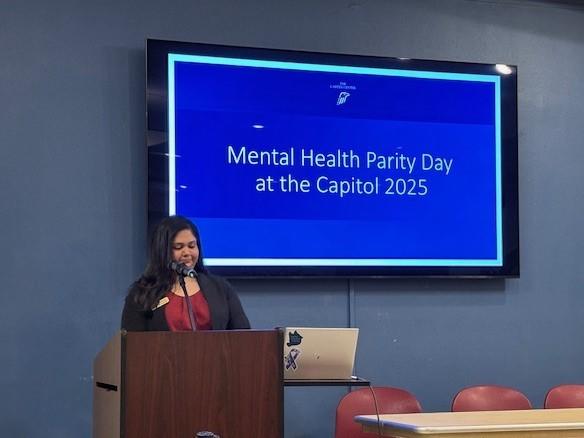
Caption
Aashna Panjwani, with the Carter Center's Public Policy Mental Health Program introduces speakers for Mental Health Parity Day at the Capitol Feb. 19, 2025.
Credit: Ellen Eldridge/GPB
LISTEN: Health insurance, by law, must cover all health care issues equally, including mental health. Advocates gathered at the state Capitol on Wednesday to draw attention to the issue. GPB’s Ellen Eldridge reports on Mental Health Parity Day.

Aashna Panjwani, with the Carter Center's Public Policy Mental Health Program introduces speakers for Mental Health Parity Day at the Capitol Feb. 19, 2025.
Know your representatives in Congress and at the state Capitol, said Eve Byrd, director of the Carter Center's Mental Health Program, on Feb. 19 at Central Presbyterian Church’s Tull Fellowship Hall.
The Legislature passed Georgia’s Mental Health Parity Act in 2022. Since then, the Carter Center and mental health care advocates have remembered the day by visiting lawmakers and holding insurance companies accountable for keeping the state law.
"Please, take a minute to write your representative," Byrd said. "Thank them for their support of this, but tell them we can't check the box. This is legislation that we can't just have on the books, but it has to be enforced."
Case in point: In 2008, Congress passed the Mental Health Parity and Addiction Equity Act, which requires commercial health plans to provide benefits covering behavioral health care treatment in a manner that is “no more restrictive” than that used for all other medical/surgical services.
Georgia's 2022 Mental Health Parity Act is meant to better enforce the federal law from 2008. But, two years into it, we still don't have detailed data to point to where these violations are, Byrd said.
Disparity exists, she said, because virtually every Georgian has or knows someone who is still paying much more out-of-pocket for their mental health care than they are for their health.
We see the problems and can identify gaps, state Rep. Mary Margaret Oliver said.
Complaints about needing prior authorization, denied residential care, and an overall lack of network resources are filed in Georgia under the 1013 process, Oliver said.
Requiring prior authorization for prescriptions continues to be a barrier in a way that's distinctively different for mental illness, she said, noting that autism services and individual therapies are limited for other states and in Georgia.
Residential care for people with substance abuse disorder or severe mental illness simply is treated differently than it should be, Oliver said.
MORE:
Insurance Commissioner John King has not fully complied, in Oliver's view, with the comparative analysis requirements that provide better data, and she and other lawmakers anticipate filing legislation this week to make the complaint process work better.
Department of Behavioral Health and Developmental Disabilities Commissioner Kevin Tanner shared recommendations from the Behavioral Health Commission Report.
"Where we are not satisfied in Georgia is that our complaint process does not include enough provider complaints," Oliver said, calling out Children's Healthcare of Atlanta.
"Their new president, Dr. [John] Constantino, has committed extensive resources to mental health services," she said. "He says that they have an analysis that shows a lot of different disparities in mental health services, particularly coming out of the ER, and yet [Children's] is not filing complaints."
They aren't the only ones, though; Children's is an example of the provider community that has not fully come forward, she said.
Parity is about both policy and practice, said Laura Colbert with Georgians for a Healthy Future.
"Parity day is an opportunity for us to come together to look at how the law is going and also make sure we're holding insurance companies accountable for meeting what's in the state law and making sure that folks have coverage for their mental health and substance use needs," she said.
Colbert says you can file a complaint if your behavioral health needs are not being met by your insurance provider.